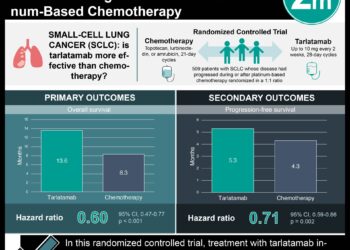Lower blood transfusion threshold in septic shock safe at 90-days
1. Patients with septic shock requiring critical care and transfused to a lower hemoglobin threshold had similar rates of mortality at 90-days after randomization as compared to those transfused to a higher threshold.
2. A lower hemoglobin threshold conserves resources with fewer total blood transfusions and no difference in use of vasopressors, mechanical ventilation and renal replacement therapy.
Evidence Rating Level: 1 (Excellent)
Study Rundown: Despite various guidelines, practices regarding the threshold for blood transfusion in the setting of septic shock continue to vary, largely due to unequivocal evidence. This multi-centered, partially-blinded trial randomized septic shock patients in the critical care setting to low (>70 g/dL) or high (>90 g/dL) hemoglobin transfusion threshold. The results revealed no significant change in mortality at 90-days after randomization. Furthermore, there were no statistically significant differences in all secondary endpoints, which included use of life supporting measures, ischemic events, and severe adverse reactions.
Screening for cardiovascular events in this study was not part of the transfusion protocol as this decision was clinically-driven. Therefore, myocardial ischemia may not have been detected in all enrolled patients and these results may not be generalizable to those with a significant history of cardiovascular disease. However, the results of this study were consistent with similar past studies currently cited in guidelines for sepsis management (i.e., TRICC, FOCUS). A lower hemoglobin transfusion threshold also reduced the number of total blood transfusions and the number of patients who were able to avoid any transfusion. Future studies will likely be powered to identify safe transfusion thresholds for specific subgroups identified by this study (i.e. septic shock patients with significant cardiovascular comorbidities).
Click to read the study, published today in NEJM
Click to read an accompanying editorial in NEJM
Relevant Reading: Liberal or Restrictive Transfusion in High-Risk Patients after Hip Surgery
In-Depth [randomized controlled trial]: 1005 patients with septic shock requiring intensive care admission were randomized into two groups: low (>70 g/dL) or high (>90 g/dL) hemoglobin transfusion thresholds. Both groups were well-matched for baseline characteristics including age, source of sepsis, and interval from ICU admission to randomization. The primary endpoint of mortality at 90-days after randomization was achieved in 43% versus 45% (low versus high, p=0.44). There was also a significant reduction in the number of blood transfusions (low versus high, 1545 v. 3088, p<0.001) and patients who did not receive any transfusions (low versus high, 176 v. 6, p<0.001). Subgroup analysis for age, presence of chronic cardiovascular disease and SAPSII score at baseline did not demonstrate any significant difference between the two groups (p=0.85, p=0.25, p=0.06, respectively).
More from this author: Brodalumab effective in treating active psoriatic arthritis, Idelalisib plus rituximab improves progression-free survival in relapsed CLL, SSRI use during pregnancy not linked to increased risk of autism, Combo antifungal therapy most effective treatment for cryptococcal meningitis
Image: PD
©2012-2014 2minutemedicine.com. All rights reserved. No works may be reproduced without expressed written consent from 2minutemedicine.com. Disclaimer: We present factual information directly from peer reviewed medical journals. No post should be construed as medical advice and is not intended as such by the authors, editors, staff or by 2minutemedicine.com. PLEASE SEE A HEALTHCARE PROVIDER IN YOUR AREA IF YOU SEEK MEDICAL ADVICE OF ANY SORT.







